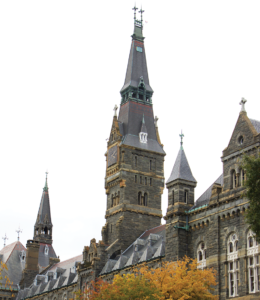Georgetown University admitted 11% of early action first-year applicants to the Class of 2029, up from 10.3% the previous year.
The university admitted 917 of 8,254 early applicants, up from 881 of 8,584 applicants accepted early to the Class of 2028, according to a university spokesperson. The university notified applicants of their application result via an online portal and mailed letters Dec. 13.
Brianna Finnegan (MSB ’29), a high school senior from New York who was accepted early to the McDonough School of Business (MSB), said her interest in both law and business drew her to the MSB.

“I’ve wanted to go to Georgetown since the summer before my junior year, when I first visited,” Finnegan wrote to The Hoya. “I love D.C., and I wanted a school where I could explore being pre-law and a business major equally, and the MSB seemed like the best place to do that.”
The MSB had the lowest acceptance rate at 9.11%, admitting 147 out of 1,613 applicants. The College of Arts & Sciences admitted 480 out of 4,396 applicants for an acceptance rate of 10.92%, while the School of Foreign Service admitted 177 out of 1,525 applicants for an acceptance rate of 11.61%. The School of Health admitted 81 out of 537 applicants for an acceptance rate of 15.08% and the School of Nursing admitted 32 out of 194 applicants for an acceptance rate of 16.49%.
Isaac Choi (MSB ’25) is the co-director of prospective student outreach for the Georgetown Admissions Ambassador Program (GAAP), a student-run organization that aims to help prospective and admitted students familiarize themselves with Georgetown through coffee chats, orientation programs and engagement.
Choi said GAAP plays an important role in creating a welcoming environment for prospective and admitted students throughout the application process.
“It’s a great way to put a face to the university and a great way to make the process a little less daunting,” Choi told The Hoya. “Having student volunteers go and talk to admits from their area and having them be the first point of contact that they have with Georgetown is a strategy we have made sure to employ as much as possible throughout the admissions process.”
Finnegan said GAAP programming and meeting fellow students made her admissions process a better experience.
“I attended the winter reception for admitted students from N.Y.,” Finnegan wrote. “It was super fun and it was really exciting to meet other students and really made me feel like a part of a community. I was definitely excited before, but meeting other students made the admission feel a little more ‘real’ and more palpably exciting.”
Choi said the receptions GAAP hosts for admitted students across the country — including Choi’s home city of Houston, Texas — make for a memorable experience for both GAAP ambassadors and students.
“I love talking to the students,” Choi said. “This past winter reception, we had around six kids apply. I love sharing my experience with them. Every group that I’ve met, they’re always just so excited and so passionate.”
Evan Schleck (SFS ’29), a high school senior from New York who was accepted early into the SFS and plans on attending, said he anxiously awaited the early action decision and was thrilled to learn of his admittance.
“Earlier that day, my friend told me that she’d seen on Reddit that the decision was coming out on Friday,” Schleck told The Hoya. “So I kind of panicked. I called the admissions office to confirm. I was just kind of anxiously waiting to hear back until like 6 p.m. because Georgetown was my top choice, and I really wanted to know what the decision was. And I was super happy to hear that I got in.”
Admissions decisions for the Class of 2029 were the first since the latest lawsuit filed involving Georgetown’s admissions process and alleged favoritism of wealthier and legacy applicants.
A university spokesperson challenged the allegations of the lawsuit in a Dec. 17 statement to The Hoya.
“We strongly disagree with the plaintiffs’ claims and will continue to vigorously defend ourselves in court,” the spokesperson wrote to The Hoya. “We believe the university has acted responsibly and always with the goal of only admitting students who will thrive in, contribute to and further strengthen our community.”
Asher Maxwell (CAS ’26), a member of Hoyas Against Legacy Admissions, a student campaign to end preference to applicants connected to graduates in admissions, said he is disappointed by the lack of clarity about the university’s admissions practices.
“We think that every student should be judged for who they are, not for what their parents have accomplished,” Maxwell told The Hoya. “We don’t think that students whose parents weren’t lucky enough to go to Georgetown should be punished for that. I think that if you are preferring legacy admits at any point in the process, that is unfair and it shouldn’t even be a relevant factor in admissions files.”
Finnegan said she wasn’t significantly concerned that Georgetown’s legacy policy would affect her when she submitted her application.
“I’m also not legacy (to Georgetown or any other comparable institution),” Finnegan wrote. “That did concern me a bit, but from my online research it seemed like only a small percentage of Georgetown students were legacy anyway, so that wasn’t something I worried about too much.”
Maxwell said that, regardless of the criteria Georgetown uses to make admissions decisions, admitted students shouldn’t let it overshadow pride in their admission.
“For every applicant that did get admitted, they should be incredibly proud of what they accomplished and very excited for what the next four years have in store,” Maxwell said.
Finnegan said she’s thrilled to arrive at the Hilltop.
“I applied early because Georgetown was my top choice, so getting in was truly a wonderful experience,” Finnegan wrote. “It definitely makes me feel like all the work I put into the application paid off!”
Nora Toscano (CAS ’27) and Ruth Abramovitz (CAS ’27) contributed to reporting.